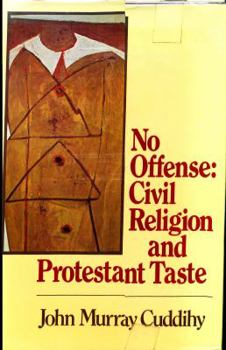No Offense: Civil Religion and Protestant Taste
American History This description may be from another edition of this product.
Format:Hardcover
Language:English
ISBN:0816403856
ISBN13:9780816403851
Release Date:January 1978
Publisher:Seabury Press
Length:232 Pages
Weight:1.30 lbs.
Customer Reviews
1 rating
America's "civil religion" trumps Catholicism, Protestantism and Judaism
Published by Thriftbooks.com User , 16 years ago
In NO OFFENSE: CIVIL RELIGION AND PROTESTANT TASTE (1978), Professor John Murray Cuddihy makes a simple, straightforward case. America has created its own special "civil religion" and that creation has driven religions imported from Europe out of the public forum. Civil religion is about behavior, not belief. It shuns depths, lives entirely on the surface of American social interactions. Its few commandments demand respect for the other fellow's religious point of view, without ever allowing him to explain what it is. Once upon a time Roman Catholic Christianity in Europe was something virtually everyone (except Jews) were born into. It claimed to be the sole channel of salvation and all men were invited to be baptized into it and never, ever leave it. Similarly, in Europe Jews usually lived in isolation, kept a strict, elaborate code of behaving and dining, did not intermarry with goyim and believed that they were God's Chosen People. After Christianity's Reformation, Protestants started out in America confidently asserting that they alone had found God's unique intentions for how to be worshipped, studied and theologized about. Sects, notably Pilgrims and Puritans wanted liberty of worship for themselves, but for no one else. In America, immigrant Catholics moved from despised minority to being socially tolerated, making up with Jews and Protestants one of three accepted "denominations." By the late 1950s some Protestant theologians had given up on converting Jews. Jews were willing to build both Jewish, Catholic and Protestant chapels at Brandeis University. After the Second Vatican Council (1962-63) Catholics began to sense that God wanted there to be Jews forever. Inter-faith movements morphed into ecumenism. Differences were played down. Points held in common were said to be what was really important -- as demanded by civil religion. But there was a price to pay. The specifics of each of the Big Three faiths, the beliefs and practices that made each unique, had to agree tacitly to go underground, to be restricted to family circle or place of worship. It was simply not seemly to probe another man's religion for details. Any American was free to join or leave any faith she chose. And yet, and yet. One was still born a Jew if he had a Jewish mother. A baby was a Christian if it was baptized. Religion was still in large measure inherited, initially, at least, not optional. Cuddihy regards the compromises that led to America's civil religion at some level a missionary triumph for Calvinist Protestantism. Calvinists (Presbyterians, Baptists) therefore feel more at home in the civil religion than do Protestants and Jews. Civil religion is their creation. Surprisingly few Americans were able to sense what was happening to them while it was happening. Fewer yet could articulate the changes. Among Catholics Father John Courtney Murray was able to baptize the First Amendment to the U. S. Constitution and sing the praises of separation of churc





